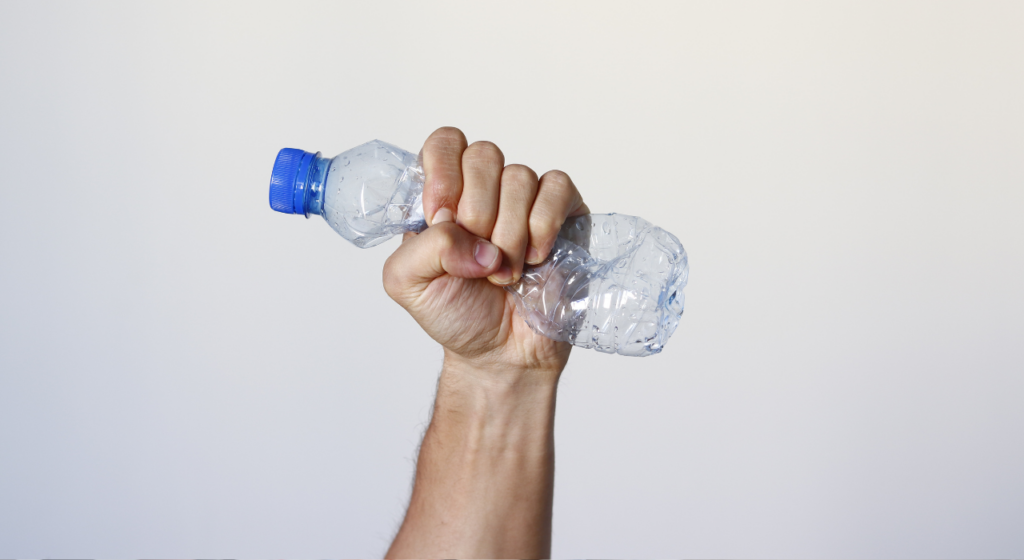There’s been talk lately about tiny bits of plastic showing up everywhere—the oceans, lakes, even in bottled water. Do you ever worry about if you might consume those plastic bits through the food and beverages you consume? Many food products are sold in plastic containers—milk, juices, yogurt, cheese, frozen foods, bread, meat, etc. The list can go on and on. A new study from the Columbia University took a closer look at some of the top bottled water brands in the US and found most had traces of plastic particles (microplastics) floating around.

What Are Microplastics?
Microplastics are tiny particles of plastic less than 5 millimeters big. They come from larger pieces of plastic breaking down into smaller bits or are manufactured as “microbeads” used in some personal care products (such as facial scrubs). Over time, plastic breaks down into these tiny pieces that make their way into water sources, the environment, and the human body.
Study Finds Plastic Particles in Bottled Water
The Columbia University study supported by the National Institute of Health used a powerful imaging technique called stimulated Raman scattering (SRS) microscopy. Using the SRS they checked three popular bottled water companies and found 93 percent of the bottled water contained microplastics—on average about 240,000 particles per liter. Can you believe that? This was 10 to 100 times more plastic pieces than seen in earlier studies because this new technique allowed them to visualize smaller particles. The study’s results were reported on January 8, 2024, in the Proceedings of the National Academy of Sciences.
Most of the microplastics came from common plastics like those used in bottle caps and also used to make water bottles. This suggests the particles could break off from the caps or bottles during manufacturing or handling. Many products, like bottled water, are not refrigerated as they are transported to stores across the nation. And it gets hot in the summer.
Potential Health Effects Still Unclear
At this point, we don’t know what health effects these microplastics may have when consumed. Unfortunately, we (humans) are the lab rats. But it raises questions about how well these products are screened. For now, it looks like microplastics are nearly everywhere, even in bottled water. More research is definitely still needed to figure out if the amounts of microplastics found in bottled water or other food or beverages can cause health issues.



Reducing Your Contact with Microplastics
If you’re concerned about microplastics in bottled water, here are some things you can do:
- Drink from the tap instead and use a reusable water filter to catch any bigger plastic bits—just remember to change the filter regularly!
- Choose bottled water sold in glass over plastic; glass bottles won’t be shedding plastic particles into the water.
- Purchase beverages and foods sold in glass versus plastic such as ketchup, mayonnaise, oil, etc.
- Ditch the single-use plastic water bottles. Stainless steel or glass reusable bottles are better for the environment.
- Support brands using plant-based or alternative plastic packaging.
- Choose aluminum cans over plastic bottles for beverages—aluminum doesn’t leach plastic particles.
- Use fewer products with plastic microbeads like face scrubs and toothpastes. Look for natural scrubby ingredients like walnut shells instead.
- Dispose of plastics properly so they don’t end up polluting water sources. Recycle when possible.
The Bottom Line
Plastic microparticles are nearly everywhere in our modern environment, including our food and drinks. Previous research has found plastic particles in human blood, feces, and placenta. But the potential health effects of these tiny plastic bits are still unproven and unknown. More research is definitely needed. The lack of it makes it difficult to determine the health effects of the microplastics we consume. Taking steps to reduce your plastic use and exposure to microplastics is a smart idea for both your health and the environment.
About the Author
Susan Neal, an RN with an MBA and masters in health science, combines her passion for health and her faith to guide others toward wellness. As an acclaimed author, of nine books including the bestseller 7 Steps to Get Off Sugar and Carbohydrates she inspires others to improve their health. Her 2024 publication, 12 Ways to Age Gracefully: How to Look and Feel Younger, uplifts the health of the senior Christian community. Her children’s book, Eat God’s Food, further extends her mission. Visit SusanUNeal.com for her insights.